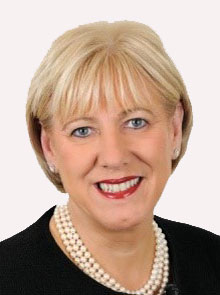Legislative change to appoint five more High Court judges approved by Dáil

Heather Humphreys
Legislative provisions paving the way for the appointment of five additional High Court judges have cleared the Dáil sooner than expected after being controversially brought forward in another bill.
The government said last month that it would include the necessary legislative changes in the Courts and Civil Law (Miscellaneous Provisions) Bill 2021 – but they were instead “bolted on” to an emergency bill dealing with outdoor drinking.
The Civil Law (Miscellaneous Provisions) Bill 2021, which was approved by TDs yesterday, allows for licensed premises to serve alcohol in outdoor seating areas and increases the number of High Court judges from 37 to 42.
Section 8 amends section 9 of the Courts and Court Officers Act 1995 to provide for an increase in the number of ordinary judges of the High Court from 37 to 42. It also provides that the government may, by order, allow for an additional judge of the High Court over the maximum number permitted.
Justice Minister Heather Humphreys said the government had agreed “to expedite an urgent provision on matters dealing with an increase in the number of ordinary judges of the High Court”.
She told TDs: “This was originally to be accommodated in the forthcoming Courts and Civil Law (Miscellaneous Provisions) Bill but was included in this bill due to its speedier progression. It is an urgent matter because of the pressures on the courts due to the Covid-19 pandemic.”
The minister added: “Despite measures taken by the Courts Service to meet the demands placed on it during the Covid-19 pandemic, including facilitating the increased use of remote hearings, the courts and judiciary continue to face unprecedented challenges in respect of available resources, particularly in the High Court.
“The existing backlog and waiting times for hearings have increased since the beginning of the pandemic and it is anticipated that there will be significant demand for access to the courts once public health restrictions are lifted.
“Furthermore, the difficulties facing the court have been further exacerbated by the appointment of a number of judges to various State bodies and tribunals of investigation. The president of the High Court flagged with the government her concerns over the pressure on the courts.”
Opposition TDs criticised the way in which the increase in High Court judges was incorporated into an emergency bill dealing with outdoor drinking.
Former Labour leader Brendan Howlin said: “This is the second time it has happened in the justice area that we have an agreement to take an emergency measure to deal with a specific bespoke problem we all agree must be dealt with speedily and now bolted on is another matter, in this case an increase in the number of High Court judges by five or perhaps six. That is not something that should be bolted on to an emergency measure.”
People Before Profit TD Paul Murphy said: “There is something quite undemocratic about an approach that takes a bill to do with licensing, outdoor drinking and so on and that includes in that bill an increase in the number of High Court judges.
“It means that it is not the focal point of the debate and discussion. Something that is not urgent and which should be part of a proper discussion is being stuck into urgent legislation. It is a very poor approach by the government.”
Independent TD Catherine Connolly said she agreed with the provision “but it should not be in the same legislation”, adding: “It is not a good precedent and nor is it good for our democracy to keep waiving pre-legislative scrutiny, albeit that the committee agreed with doing it.”
Speaking at the end of the debate, Hildegarde Naughton, minister of state with responsibility for civil and criminal justice, said the matter had to be brought forward “given its urgency, which is also linked to Covid-19 matters”.
She said the assignment of judges to the Law Reform Commission and the Garda Síochána Ombudsman Commission meant that the number of judges available to sit in the High Court in the coming months “in real terms” had been reduced to 36.









